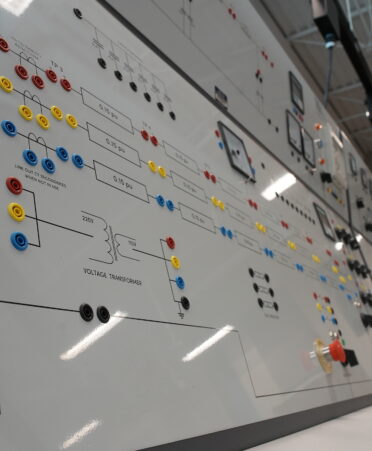(WACO, Texas) – The process of making sure that students have jobs before they graduate from Texas State Technical College’s Electrical Power and Controls program begins as early as the first semester.
Michael Cooper, a program instructor at TSTC’s Waco campus, said students entering the program typically enroll because they know someone who is in the industry or has graduated from TSTC.
The Electrical Power and Controls program teaches students about the devices and systems that regulate the flow and distribution of electrical power. Students are exposed to automation, circuits, motors, switches, transformers, and other equipment used to distribute electricity to a given system.
“We start everyone at the same level and teach the basics on a small scale,” Cooper said.
Cooper said faculty members work with students to help them find an interest within the program and develop that into a potential career. Early on, program faculty also instill in students lessons in soft skills, such as showing up to class on time and developing integrity, professionalism and a good work ethic.
Students are introduced in the first semester to the college’s Career Services department staff and learn about their work with company visits and industry job events.
“We have employers standing in line to interview students,” said Curt Wade, the program’s lead instructor at TSTC’s Waco campus.
Wade said he and the program’s faculty take pride in its 100% job placement rate for graduates.
He said employers know they need to develop the best hiring package to attract the program’s students. He said base salaries for graduates can start in the $60,000 range and increase due to overtime and other factors.
Kevin Barnett, field service manager at Shermco Industries in Irving and a member of the advisory board for TSTC’s Electrical Power and Controls program, said job applicants who stand out have a good working knowledge of electrical theory along with self-motivation.
“TSTC gives the students the fundamentals and theory on electrical power needed to build on to develop into a field service technician,” he said.
Barnett said some company applicants lack hands-on InterNational Electrical Testing Association (NETA) certification testing. There are four NETA-certified technician levels for the electrical testing and maintenance field, ranging from trainee technician to certified senior technician.
Cooper said although the program does not offer NETA testing to students, it does support the college’s Workforce Training and Continuing Education department’s Heroes Make America initiative, which provides a skills bridge for transitioning military personnel and their dependents.
“While Electrical Power and Controls does not provide licensing for journeyman or master electrician, our graduating students are more than capable of taking such a test and passing it,” he said. “We advise our students that they wait until they are employed so that if a specific company requires such a license, then the employer can support the student — now an employee — to obtain that license. This saves the student time and cost to pursue it on their own.”
The Electrical Power and Controls program is part of TSTC’s Money-Back Guarantee initiative. The college’s commitment to participating students is simple: If they do not have a job in their field within six months of graduation, then they will receive a full refund of their tuition.
TSTC offers an Associate of Applied Science degree in Electrical Power and Controls at the Abilene, Fort Bend County, North Texas and Waco campuses.
For more information on TSTC, go to tstc.edu.
